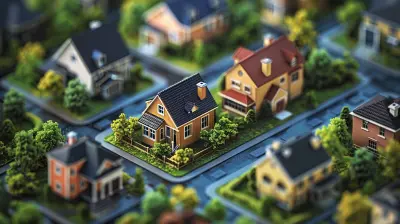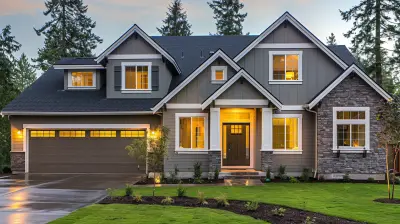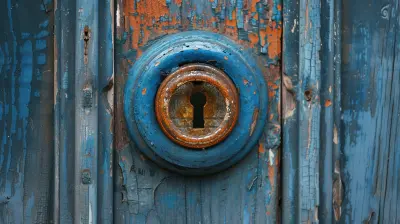Are We in a Housing Bubble? Signs to Watch for
8 June 2025
The real estate market has been on a wild ride over the past few years. Home prices have skyrocketed, bidding wars have become the norm, and buyers are stretching their budgets to secure a home. But this raises an important question: Are we in a housing bubble?
If you're wondering whether the market is overheated and due for a crash, you're not alone. Spotting a housing bubble isn't always easy, but there are key signs to watch for. In this article, we'll break down what a housing bubble is, what causes it, and the red flags that indicate we might be in one right now. 
What Exactly Is a Housing Bubble?
A housing bubble happens when home prices rise too quickly, far beyond what’s justified by economic fundamentals like income levels and demand. This sharp rise is often fueled by speculation, easy mortgage lending, and a frenzy of buyers afraid of missing out.Like all bubbles, a housing bubble eventually pops. When that happens, home prices can plummet, leaving homeowners underwater on their mortgages (owing more than their home is worth). The aftermath can be brutal, as we saw during the 2008 financial crisis.
So, is the housing market in bubble territory right now? Let’s take a closer look at the signs that might indicate trouble ahead. 
7 Signs We Might Be in a Housing Bubble
1. Home Prices Are Rising Faster Than Incomes
When home prices far outpace wage growth, it’s a red flag. Ideally, home prices should rise at a steady, sustainable rate in line with how much people earn. But if buyers need to stretch their budgets to extreme levels just to afford a home, there’s a problem.Right now, in many areas, home prices have surged far beyond wage increases. This imbalance can make housing unaffordable for many buyers and signals that the market may not be sustainable long-term.
2. Low Mortgage Rates Fueling Frenzy
Historically low mortgage rates can make borrowing cheap, leading to a surge in demand. When interest rates are rock-bottom, more people can afford to buy homes, pushing prices higher.However, when rates eventually rise, affordability drops, and demand can shrink quickly—leading to falling home prices. If buyers are relying too heavily on low rates to justify their purchases, trouble could be ahead.
3. Bidding Wars and Homes Selling Over Asking Price
Have you heard stories of homes selling within hours and buyers offering way over asking price? The fear of missing out (FOMO) can cause buyers to throw rational decision-making out the window.When people are willing to pay anything just to secure a home, it’s a telltale sign of an overheated market. Extreme bidding wars are not normal or sustainable.
4. Investors Snapping Up Properties
When investors flood the market, scooping up properties to flip or rent out, it can drive prices up unnaturally. While investment in real estate isn’t bad, too much speculative buying can create artificial demand.If a significant percentage of home purchases are from investors rather than actual homeowners, it can signal that the market is becoming speculative rather than stable.
5. Relaxed Lending Standards
If banks and lenders start handing out mortgages too easily—without requiring strong credit or down payments—it could be a warning sign. This was a major factor in the 2008 housing crash when risky lending practices led to widespread defaults.While lending standards have tightened since then, if we start seeing a return to risky loans (like zero-down mortgages or adjustable-rate loans with teaser rates), it could spell trouble.
6. Housing Inventory Is Extremely Low
A shortage of homes available for sale can drive prices to unsustainable levels. When supply can't keep up with demand, buyers become desperate, leading to skyrocketing prices.However, if inventory suddenly increases—due to rising interest rates, economic issues, or changing buyer demand—prices could begin to drop rapidly.
7. Speculation Over Fundamentals
Are people buying homes because they need a place to live, or because they think prices will keep rising and they can cash in later?When speculation drives demand rather than actual housing needs, it’s a recipe for disaster. If too many buyers are banking on ever-increasing prices rather than focusing on affordability and long-term financial health, we could be in bubble territory. 
Are We Headed for a Housing Crash?
Not necessarily. While some of these warning signs are present in today’s market, that doesn’t automatically mean a crash is imminent. Unlike the 2008 crisis, lending practices are generally more responsible, and there’s still a strong demand for housing.However, that doesn’t mean prices will continue to soar indefinitely. If interest rates rise, the economy slows, or demand weakens, we could see a market correction where prices stabilize or even decline.
Most experts believe that while a bubble may be forming in some areas, a dramatic crash like 2008 is less likely. Instead, we may see a cooling-off period where price growth slows or even reverses slightly. 
What Should Buyers and Sellers Do?
If you’re a buyer, don’t panic-buy out of fear of missing out. Make sure you can truly afford the home you're considering, even if interest rates rise. A good rule of thumb is to buy for long-term stability, not short-term profit.If you’re a seller, it might be a good time to list your home while demand is still strong. However, be realistic about pricing—buyers may not be as willing to pay extreme prices as they were a year ago.
For investors, be cautious. If you’re buying properties expecting continued price appreciation, you may want to reevaluate your strategy. Rental income should be your primary focus rather than speculative gains.
Final Thoughts
So, are we in a housing bubble? While some warning signs are flashing, it's not guaranteed that we'll see a devastating crash like in 2008. However, it’s essential to be aware of the risks and make informed decisions.If you're buying or selling a home, keep a close eye on market trends, interest rates, and lending practices. And most importantly, don’t let FOMO or speculation drive your decisions—real estate should be a long-term investment, not a gamble.
The housing market can be unpredictable, but staying informed will help you navigate whatever comes next.
all images in this post were generated using AI tools
Category:
Housing MarketAuthor:

Elsa McLaurin
Discussion
rate this article
3 comments
Zethryn Howard
This article provides valuable insights into identifying potential housing bubbles, highlighting key indicators such as rapid price increases, rising inventory, and changes in mortgage rates. Monitoring these signs can help buyers and investors make informed decisions in the real estate market.
June 19, 2025 at 4:23 AM

Elsa McLaurin
Thank you for your feedback! I'm glad you found the insights on identifying housing bubbles helpful for making informed decisions.
Marlowe McGillivray
Great insights! It's always good to stay informed. I’ll definitely keep an eye out for those signs!
June 11, 2025 at 12:39 PM

Elsa McLaurin
Thank you! I'm glad you found the insights helpful. Staying informed is key!
Marissa Velez
Interesting insights! Monitoring inventory levels and price trends will be crucial in determining if we’re actually in a housing bubble. Thanks for the informative read!
June 8, 2025 at 4:30 AM

Elsa McLaurin
Thank you for your feedback! I'm glad you found the insights helpful. Monitoring those factors is indeed key to understanding the market.



